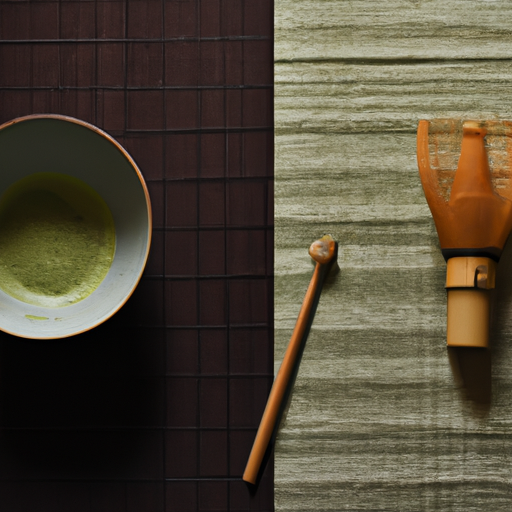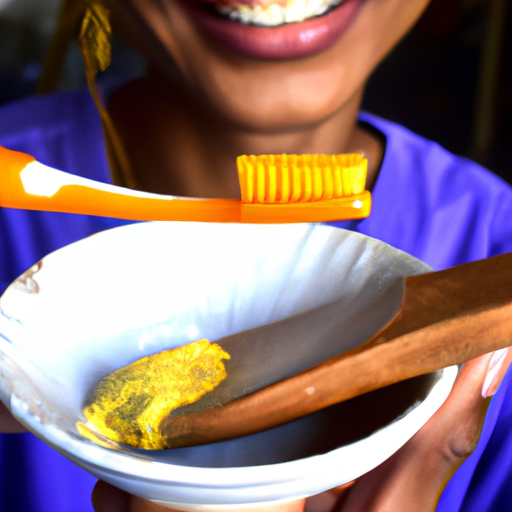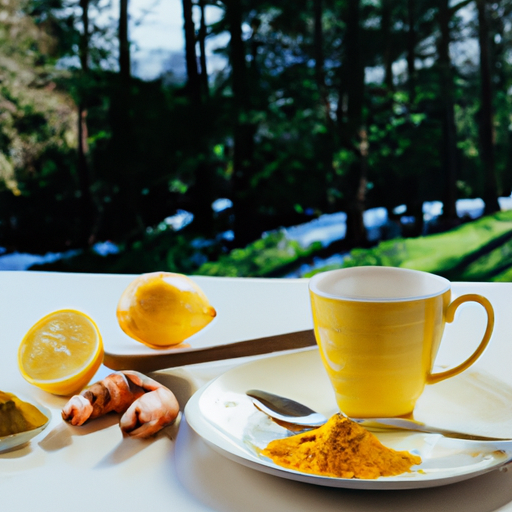Hello! Are you in search of a comforting and soothing drink that also offers a myriad of health advantages? Search no more, because ginger and turmeric tea is exactly what you need!
As someone who loves making this tea for myself, I can attest to its delicious taste and positive effects on my body.
Ginger and turmeric are both known for their anti-inflammatory properties, which can help alleviate pain and reduce inflammation in the body.
Ginger is also great for digestion and can help soothe an upset stomach, while turmeric has been shown to improve brain function and lower the risk of heart disease.
Plus, both spices are packed with antioxidants that can boost your immune system. So not only does this tea taste great, it’s also incredibly good for you!
Key Takeaways
- Ginger and turmeric tea has numerous health benefits, including anti-inflammatory properties, aiding in digestion, improving brain function, boosting the immune system, and more.
- To make ginger and turmeric tea, boil water and simmer grated or sliced ginger and turmeric for a desired amount of time, then strain and add optional flavorings like honey or lemon.
- Sweeteners like honey, stevia, maple syrup, and locally sourced raw honey can add flavor and health benefits to the tea.
- Experimenting with variations like iced tea or ginger lemonade can enhance the tea experience, and leftover tea should be stored in an airtight container in a cool, dark place.
The Health Benefits of Ginger and Turmeric
You’re about to discover how sipping on a warm cup of ginger and turmeric tea can boost your health in so many ways! Turmeric, a spice commonly used in Indian cuisine, contains curcumin which has been shown to have anti-inflammatory properties. Ginger, another spice known for its medicinal properties, is high in antioxidants and can help with digestion issues.
Incorporating these powerful spices into your daily routine can be easy and delicious. There are numerous turmeric recipes available online for everything from smoothies to soups. If you’re not a fan of cooking or simply don’t have the time, ginger supplements are widely available at health food stores and online.
So why not try adding some ginger and turmeric into your diet? Not only will it add flavor to your meals or tea, but it may also provide numerous health benefits.
Now that you know the benefits of these ingredients, let’s gather our ingredients and start making some tea!
Gather Your Ingredients
Once you’ve got all the necessary ingredients in your kitchen, it’s as easy as mixing together sunshine-colored spices to create a warm and comforting elixir that’s like a hug in a mug. For this recipe, you’ll need fresh ginger root, fresh turmeric root, honey or maple syrup for sweetness, lemon juice for a citrusy kick, and water. Don’t worry if you don’t have all of these on hand – there are ingredient substitutes available! Instead of fresh ginger root, try using ground ginger powder. If you’re out of fresh turmeric root, ground turmeric powder will do the trick.
Here’s a helpful table to guide you through some ingredient substitutions:
| Ingredient | Substitute |
|---|---|
| Fresh Ginger Root | Ground Ginger Powder |
| Fresh Turmeric Root | Ground Turmeric Powder |
| Honey | Maple Syrup |
| Lemon Juice | Lime Juice |
Don’t limit yourself to just making tea with these two powerful spices! There are different ways to use ginger and turmeric in your cooking – add them to stir-fries for an extra zing or use them in marinades for chicken or tofu. The possibilities are endless!
Gather all your chosen ingredients together and let’s move onto preparing the ginger and turmeric.
Prepare the Ginger and Turmeric
Get ready to experience a burst of warmth and flavor as you chop up the fragrant ginger and turmeric roots into small pieces. When preparing these ingredients, there are two main methods: grating or slicing.
Grating is ideal for those who want a finer texture while slicing is perfect for those who prefer larger chunks. It’s important to note that the preparation method also affects the flavor profile of your tea.
If you grate the ginger and turmeric, it will release more of its natural oils, resulting in a stronger aroma and taste. Slicing, on the other hand, will give your tea a milder flavor with subtle notes of spice.
Now that you’ve prepared your ginger and turmeric using either grating or slicing methods, it’s time to move on to boiling the water for your tea.
Boil the Water
To achieve the perfect cup of ginger and turmeric tea, start by bringing water to a rolling boil in a small pot. Boiling water is an essential step when making tea because it helps to extract the flavors and nutrients from the ingredients. Additionally, boiling water can provide health benefits such as killing bacteria and reducing impurities that may be present in tap water.
Different types of tea require different temperatures for optimal flavor extraction. For example, green tea is best made with water that has been heated just below boiling point, while black tea requires fully boiled water. Ginger and turmeric tea falls into the latter category since both ingredients are hardy and can withstand high temperatures without losing their potency. When using boiled water for this recipe, you can rest assured that every sip will be packed with flavor.
Now that we’ve boiled our water to perfection, it’s time to add the ginger and turmeric to infuse their goodness into our brew. By simmering these aromatic roots in hot water, we release all their natural oils and compounds which offer numerous health benefits such as reducing inflammation and aiding digestion. So let’s go ahead and add them to our pot of hot water!
Add the Ginger and Turmeric to the Water
Let’s infuse our water with the aromatic flavors and health benefits of ginger and turmeric by adding them to our perfectly boiled pot. To ensure that we get the best brewing methods, it’s important to use fresh ginger and turmeric roots. You can easily find these in your local grocery store or farmer’s market. You may also opt to use powdered versions, but fresh ones provide a more intense flavor.
Different variations of this tea exist, depending on one’s preference or mood. Some people add lemon or honey for an added tangy taste, while others prefer to keep it pure for its natural benefits. Whichever way you decide to make yours, start by grating about two inches of ginger root and one inch of turmeric root into the boiling water. Stir well before covering the pot with a lid.
As we let the mixture simmer, allow all the flavors to blend in together for at least 10-15 minutes. This will give enough time for all the juices from both ingredients to come out fully.
Now that you have infused your water with all these healthy goodnesses, let’s move on to filtering out any bits before enjoying your cup of ginger and turmeric tea!
Add the ginger and turmeric to the water.
Let the Mixture Simmer
While the mixture simmers, the aroma of ginger and turmeric fills the kitchen, reminding me of my trip to India where I first discovered this delicious and healthy beverage. Simmering allows the flavors of ginger and turmeric to infuse into the water slowly. The longer you simmer, the more intense the flavor becomes. However, be careful not to over-simmer as it may lead to a bitter taste.
The beauty of ginger and turmeric tea is that you can customize it according to your preference. You can add honey or lemon for a sweeter taste or adjust the amount of ginger and turmeric based on your desired level of spiciness. You can also experiment with other spices such as cinnamon or cloves for added flavor variations.
Once you are satisfied with how long you have let your mixture simmer, it’s time to strain the tea. This step ensures that any leftover bits of ginger or turmeric are removed from your drink while leaving behind all their health benefits.
Strain the Tea
After simmering the mixture, it’s important to strain the tea so that all of the health benefits are retained while any leftover bits of ginger or turmeric are removed.
There are many different straining techniques you can use, but my personal favorite is to pour the tea through a fine mesh sieve into a heat-resistant pitcher or teapot. This helps catch any small pieces of ginger and turmeric that may have escaped during the steeping process.
Once you’ve strained your tea, it’s time to add any optional flavorings. While ginger and turmeric have plenty of natural flavor on their own, adding honey or lemon can help enhance the taste even further.
I like to use raw honey for a touch of sweetness and lemon juice for a tangy kick. But feel free to experiment with other ingredients like cinnamon, cloves, or mint leaves!
With your freshly brewed ginger and turmeric tea now perfectly strained and flavored, it’s time to sit back and enjoy all its amazing health benefits! Whether you’re using it as an immune booster during cold season or simply as a delicious way to unwind after a long day, this tea is sure to become a staple in your beverage rotation.
Add Honey or Lemon (Optional)
To enhance the flavor of your freshly brewed ginger and turmeric tea, you can add a touch of sweetness with honey or a tangy kick with lemon juice. Both options offer unique health benefits that can complement the already powerful effects of this tea.
Here are three ways to experiment with using different sweeteners:
-
Raw Honey: Not only does it add sweetness, but raw honey also provides antibacterial and antioxidant properties. It’s important to note that heating honey above 118°F (48°C) destroys these beneficial enzymes, so make sure your tea has cooled down before adding it.
-
Stevia: For those looking for a calorie-free option, stevia is a natural sweetener derived from the leaves of the Stevia rebaudiana plant. It’s about 200-300 times sweeter than sugar, so a little goes a long way.
-
Maple Syrup: If you prefer a more earthy and robust flavor profile, maple syrup can be an excellent addition to ginger and turmeric tea. It’s also loaded with antioxidants and minerals like zinc and manganese.
Incorporating any of these sweeteners will not only enhance the taste but also provide additional health benefits to your ginger and turmeric tea.
Adding honey or lemon juice is completely optional based on personal preference. However, if you do decide to add something extra, keep in mind that both have their own unique health benefits when added to hot beverages like tea. For example, research has shown that consuming locally sourced raw honey can help alleviate allergies by exposing your body to small amounts of pollen over time.
Serve and enjoy! After adding any desired sweeteners, give your tea one final stir before pouring into your favorite mug or teacup. Take some time to savor each sip while enjoying the many benefits this delicious beverage has to offer!
Serve and Enjoy!
Once you have added any desired sweeteners, give your freshly brewed beverage one final stir before pouring it into your favorite mug or teacup to serve and savor each sip while appreciating the multitude of benefits this delicious drink has to offer! Whether you prefer it hot or cold, ginger and turmeric tea can be enjoyed in a variety of ways. Here are some tea variations and serving suggestions that you might want to try:
| Tea Variation | Serving Suggestion |
|---|---|
| Iced Tea | Serve over ice with a slice of lemon or lime for a refreshing summer drink. |
| Chai Tea | Add black tea leaves, cinnamon sticks, cardamom pods, cloves, and milk for a spicy twist on traditional chai. |
| Golden Milk | Heat up with almond milk and honey for a creamy and comforting bedtime beverage. |
| Ginger Lemonade | Mix with fresh lemon juice and sparkling water for a zesty non-alcoholic cocktail. |
Experimenting with different tea variations can make your ginger and turmeric tea experience even more enjoyable. Don’t be afraid to get creative in the kitchen!
For best results, store any leftover ginger and turmeric tea in an airtight container in the refrigerator for up to 3 days. When reheating, gently heat on the stovetop or microwave until warm but not boiling. Avoid overheating as it may diminish some of the health benefits of the spices. With these tips in mind, you can continue to enjoy your homemade ginger and turmeric tea long after brewing!
Tips for Storing and Reheating Ginger and Turmeric Tea
Storing and reheating your homemade ginger and turmeric tea can be easy with a few helpful tips, so you don’t have to worry about wasting any of this delicious drink. As someone who loves to make my own tea blends, I’ve learned some tricks for keeping the flavors fresh and making sure my tea is always ready when I want it.
Here are four storing tips that have worked well for me:
- Store your tea in an airtight container to keep out moisture and air.
- Keep your tea away from heat sources, sunlight, and strong odors that could affect the taste or aroma.
- Label your container with the date you made the tea so you know how long it’s been stored.
- If possible, store your tea in a cool, dark place like a pantry or cupboard.
When it comes to reheating techniques for ginger and turmeric tea, there are a few things to keep in mind as well:
- Avoid using a microwave if possible because this can affect the flavor of the ginger and turmeric.
- Heat up water separately before adding in your pre-made tea mixture.
- Be careful not to overheat or boil the mixture as this can lead to bitterness.
- Strain out any solids before reheating if necessary.
With these simple tips for storing and reheating ginger and turmeric tea, you’ll be able to enjoy all its benefits without worrying about waste or stale flavors!
Frequently Asked Questions
How much ginger and turmeric should be used in the tea?
When it comes to making ginger and turmeric tea, the ratio of ginger to turmeric can vary depending on your personal preference. I typically use about a thumb-sized piece of fresh ginger and a teaspoon of ground turmeric for one cup of tea. However, you could adjust this based on how strong or mild you like the flavors.
Ginger and turmeric are both known for their anti-inflammatory properties, making them a great addition to any tea blend. Drinking this tea regularly can help reduce inflammation in the body and boost overall health. So don’t be afraid to experiment with different ratios until you find the perfect balance for your taste buds!
Can the tea be made with ground ginger and turmeric instead of fresh?
When it comes to making ginger and turmeric tea, the question of whether to use ground or fresh ginger and turmeric is a valid one. While using fresh ingredients may provide a stronger flavor and potentially more health benefits, using ground versions can still be effective.
It’s important to note that when using ground ginger and turmeric, you’ll likely need less of each compared to their fresh counterparts since they are concentrated. Both ginger and turmeric have numerous health benefits such as reducing inflammation, aiding digestion, and boosting immunity.
So whether you choose to use ground or fresh ingredients in your tea, know that you’re still reaping the benefits of these powerful spices.
How long should the tea be steeped before straining?
I remember the first time I made ginger and turmeric tea using freshly grated ginger and turmeric root. It was a chilly morning, and I needed something warm to start my day.
The tea had a strong, spicy flavor that woke me up instantly. When it comes to steeping time, I’ve found that five minutes is usually enough for the flavors to infuse into the water fully. However, if you want a more intense flavor, you can let it steep for up to ten minutes.
The longer you steep the tea, the stronger it will become in terms of both taste and color. Ultimately, it all depends on your personal preference – experiment with different steeping times until you find what works best for you!
Can the tea be consumed cold or does it have to be hot?
When it comes to consuming ginger and turmeric tea, the temperature really depends on personal preference. While many people enjoy their tea hot, it can certainly be consumed cold as well. In fact, some even prefer it chilled during the summer months.
No matter how you choose to drink it, ginger and turmeric tea offers a variety of health benefits that make it a great addition to any diet. From reducing inflammation to boosting immunity, this herbal blend is packed with antioxidants and anti-inflammatory compounds that have been shown to improve overall health and wellbeing.
So whether you prefer your tea hot or cold, there’s no denying the many benefits of incorporating ginger and turmeric into your daily routine.
Are there any side effects or precautions to be aware of when consuming ginger and turmeric tea?
Before diving into the possible side effects and safety precautions of consuming ginger and turmeric tea, it’s important to note that both herbs have been found to offer numerous health benefits.
Ginger is known for its ability to reduce nausea, relieve pain and inflammation, protect against certain types of cancer, and improve digestion.
Turmeric, on the other hand, is a powerful antioxidant with anti-inflammatory properties that has been linked to improved brain function and a lower risk of heart disease.
However, as with any herbal remedy or dietary supplement, there are potential risks and contraindications to be aware of.
Some possible side effects include upset stomach, diarrhea, allergic reactions, and interactions with certain medications.
It’s also important to note that ginger and turmeric supplements may not provide the same benefits as consuming these herbs in their natural form through food or tea.
As always, it’s best to consult with a healthcare provider before incorporating new foods or supplements into your diet if you have any medical conditions or concerns about potential interactions.
Conclusion
Well folks, there you have it – a simple and easy recipe for making ginger and turmeric tea. But let’s be real, who has the time or energy to make their own tea? Why bother when you can just grab a sugary, processed iced tea from your local corner store?
But seriously, ginger and turmeric are not only delicious but also packed with health benefits. So why not give this homemade tea a try? It’s a great way to boost your immune system and fight off those pesky colds. And if you’re feeling adventurous, add some honey or lemon for an extra kick.
So go ahead and impress your friends with your newfound tea-making skills. Who knows, maybe they’ll even start calling you the ‘Tea Master.’
And remember, don’t settle for mediocre iced teas when you can make something truly special right in the comfort of your own home.










